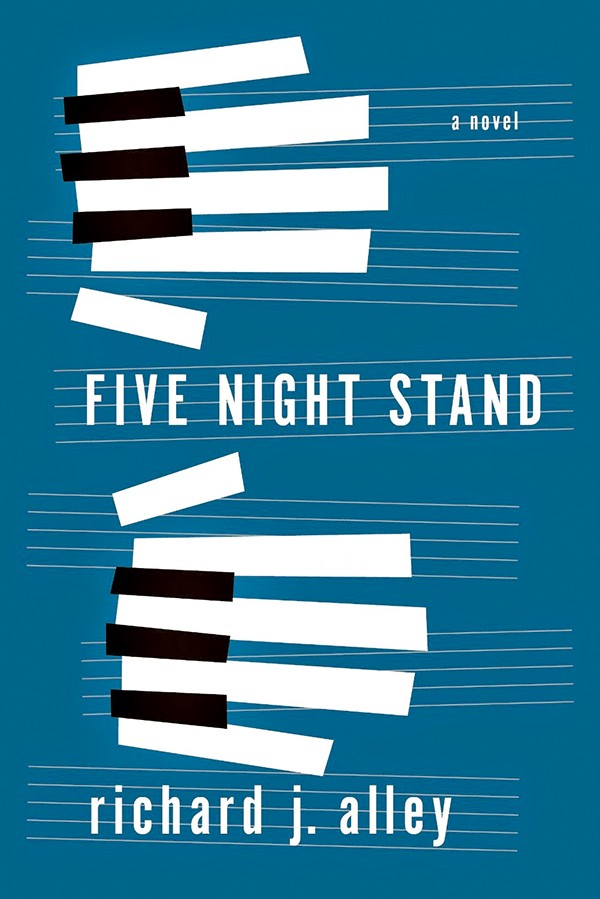Jazz lover Richard J. Alley doesn’t play jazz himself, but Oliver Pleasant and Agnes Cassady do. And both of them are star players in Alley’s new novel, Five Night Stand (Lake Union Publishing).
Alley isn’t a laid-off Memphis newspaperman either, but Frank Severs is. And in Five Night Stand, Severs is in New York City the week that Pleasant is playing in the basement club of a Manhattan hotel. It’s a farewell gig before the aged Pleasant — who grew up in segregated, small-town Mississippi and who went on to become a world-class jazz pianist — moves to Memphis to live out his days with his sister and niece.
Cassady — a 22-year-old white jazz pianist from Memphis now playing clubs in New Orleans — is in New York too. She’s there to see about the medical condition that is threatening her career, but she’s taking in Pleasant’s five-night stand as well. Severs, a 41-year-old struggling freelancer, is on hand too to interview Pleasant for a future article, but he’s struggling with the tensions inside his marriage back home in Memphis and with his own deferred dreams of being a novelist.

That’s a very brief summary of Alley’s ambitious debut novel — one that follows the complicated lives and troubled back stories of its three lead characters — but this isn’t his first novel. It’s his third (the first two are unpublished), and it draws on the author’s knowledge of jazz, his Memphis roots, and his career in journalism. A former freelance columnist for The Commercial Appeal, Alley is now editor of Inside Memphis Business and a contributing writer at Memphis magazine, both of them sister publications of The Memphis Flyer.
In a recent interview with Alley, the topic wasn’t journalism, however. It was the road to publication. After failing at finding an agent and publisher, in 2014, Alley entered Five Night Stand in the Amazon Breakthrough Novel competition, where it reached the semifinal round. (From 2,000 submissions down to 100 in Alley’s genre.) When Five Night Stand didn’t make it to the next round, Alley admitted to thinking: “Maybe that’s it. What’s next? What do I do?”
An acquisitions editor at Amazon Publishing knew what to do. According to Alley, “She picked up the manuscript, started reading it, got sucked in, took it to her people, made the offer to publish, and here we are.”
But that’s not where Five Night Stand once stood. It began as a short story featuring only Pleasant and Cassady — a story that, once written, went back into Alley’s desk drawer. When he reread it, he realized that the story was really a long outline to a more fully developed story. It could be fleshed out to make a novel. The five days and nights that the story covers: The structure for a novel was there. Alley wrote in other, minor characters. He wrote in another, major character: Frank Severs. But if you think Severs is a stand-in for the author, Alley never saw him that way. Their circumstances are too dissimilar. One thing they do share, however: journalist turned fiction writer.
Alley as a fiction writer proved his talent by winning Memphis magazine’s annual fiction contest in 2011. But he’s been penning short stories since he was in his late teens. He’d just never “focused on it, never thought of it as something you really worked toward.” Nor had Alley stopped to think of himself as a fiction writer in the company of other writers. Novelist and short-story writer Richard Bausch saw to that in the creative writing workshop he led in 2010, when he was teaching at the University of Memphis.
“Bausch doesn’t give much advice as far as the nuts and bolts of structuring a story or even how to go about getting published,” Alley said of the workshop. “What he did do was to treat us all as equals. He called us ‘writers,’ and that was huge for me. I was freelance writing at that point and had just won the Memphis fiction contest, but it was still hard for me to refer to myself as a writer. Bausch made it okay. He made me see that there is value in the process regardless of the end product and whether or not it was published. That was the boost I needed just when I needed it.”
It’s the very same boost novelist Frank Severs needs — and that Oliver Pleasant gives him — in the life-changing, closing pages of Five Night Stand.